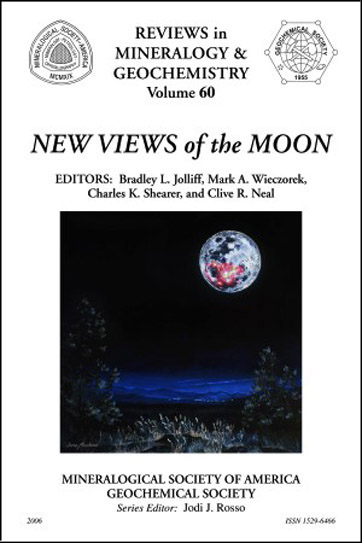
image from Mineralogical Society of America
In the last decade a large number of new lunar books has appeared for the amateur, but books reporting on professional studies of the Moon have been sparse. Now, with a resounding thump, a new tome has been published that will keep you reading for a long time. New Views of the Moon is a 721 page collection of seven nearly independent review articles co-written by about 60 of the leading lunar scientists. The purpose of the book is to summarize what was known and theorized about the Moon prior to the onslaught of new missions beginning with SMART-1 and continuing with Chinese, Indian, Japanese and American orbiters and someday human missions. Unfortunately, the book took four years to compile (can you imagine prodding for 60 authors to write their sections!) so that it is a few years out of date. But what is included is a dense overview of almost everything a professional lunar scientist would want to know about the Moon. And that differs, often, from what an observer would like to know. For example, the seven chapters deal with processes such as the mechanics of impact cratering, fractionation of the lunar interior, and weathering of surface materials. Petrology, the study of rocks and the minerals that make them, consumes hundreds of pages, including both the laboratory studies of the specimens themselves and remote sensing mapping of their distributions. The chapters of greatest interest to the observer are Chapter 1 Introduction and Overview and Chapter 5: Cratering History and Lunar Chronology. The first chapter is an 82 page summary of lunar science and especially surface geology - this would make a very useful stand alone book. Chapter 5 includes descriptions of impact crater morphologies and the stratigraphic timescale. Most of the remainder of the book - in fact, the vast majority of it, will be quite difficult for any reader who is not well versed in lunar geology. I am very happy to have New Views and note that it is almost exactly the same size as a 1965 compendium written by that era’s lunar experts, Geologic Problems in Lunar Research. I remember the excitement of getting Geologic Problems when it came out, and again 41 years later when I received New Views. Although I had nothing to do with either of them, these seem like bookends of my career.
Technical Details:
New Views of the Moon cost $45 (paperback) and $55 (hardback) and is available from the Mineralogical Society of America. Everyone loving the Moon should thank the editors: Bradley Jolliff, Mark Wieczorek, Charles Shearer and Clive Neal.
Yesterday's LPOD: Polar Triptych
Tomorrow's LPOD: A Young, Deep Maria
COMMENTS?
Register, Log in, and join in the comments.



